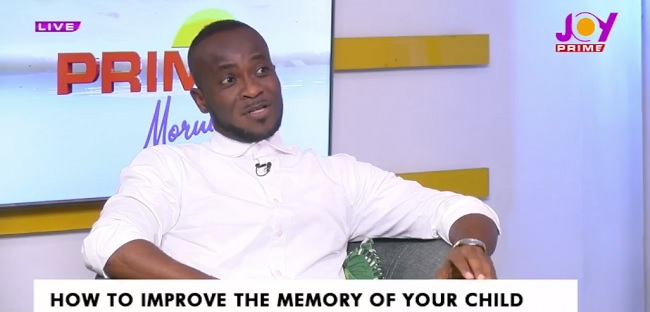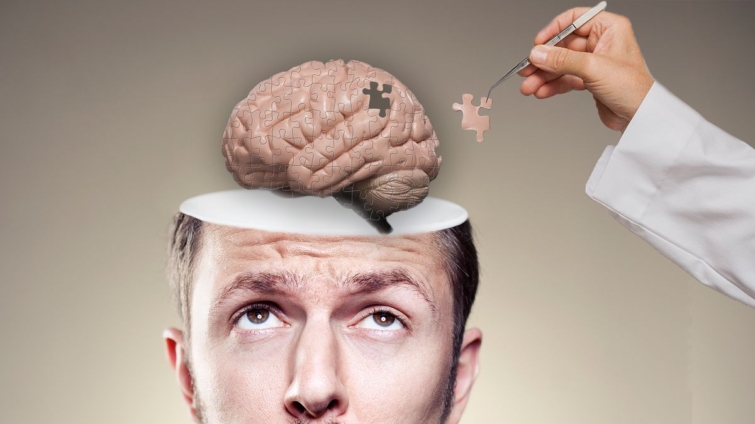The brain is the most complex part of the human body. It is a complex organ that controls thought, memory, emotion, touch, motor skills, vision, breathing, temperature, hunger, and every other process that regulates our body.
It is believed that people lose their memory as they grow older. Well, it might be true, but have you ever thought about whether the brain can be improved or not, no matter how old we grow?
According to memory trainer Godwin Adu Afful, who doubles as a lecturer, the brain can always be improved at all stages of life. In explaining the things that can be done to enhance the brain, he used the “HEADLESS” acronym.

Hydration – Like every part of the body, the brain needs water to function properly. Drinking a lot of water aids in the smooth movement of blood vessels, nerves, and other cells to make way for effective thinking. The brain becomes one of the most affected organs when the body is improperly hydrated.
“Your brain is 75 percent water. When you’re not having enough water in your brain, chances are that it could impair memory; it could affect your mood and attention. So, I keep telling people that sometimes, when you’re not thinking clearly, chances are that you’re not properly hydrated. So you need to drink a lot of water. Like other devices, the brain needs water to perform,” Mr. Afful explained.
Exercise – Regular exercise helps to expand and grow more neurons in the hippocampus (the memory centre) of the brain. According to Mr. Afful, over 55 million people are estimated to be living with dementia due to an ineffective lifestyle. Initially, dementia was common among older people but has spread to younger people because of the failure to exercise and train the brain. That notwithstanding, the memory trainer has revealed that the number of cases is projected to double by 2030.
“You need to exercise if you care about your brain. We need to take our brain into our own hands and start training it. What you don’t use, you lose. So, if we don’t train our brain, we’ll lose it to dementia. These days, we don’t train our brains. We have outsourced our thinking to technology. Back in the day, we tried to memorise phone numbers because it stretches your brain. So you have to now cease the opportunity to stretch the range of your brain… So, exercise is good. It also releases dopamine, which elevates your mood, and when your mood is elevated, learning becomes easier for you.”
Affirmation – It is usually considered spiritual, but Mr. Afful averred that affirmation is scientifically proven to play a fundamental role in the improvement of the brain. “Everything you say makes a connection in your brain. Your words are sensory data, so when you give out your words, they bounce back to you, and then they become a connection in your brain.” In neuroscience, he said affirmation becomes hardware in the brain but develops into a software programme when it is repeatedly said and dictates one’s behavior. Nevertheless, when a person affirms but does not believe, the brain is unable to accept and programme it into reality. “So, whenever I say thank you and I feel and believe it, the brain thinks that you have already received it, then it changes your mind and goes to work to make it happen.”
Dieting – The brain takes about 20 percent of the nutrients, making it the highest absorber among other organs of the body. Therefore, it is difficult for the brain to work effectively when it receives junk food. Some foods that help enhance the brain include dark chocolate, eggs, vegetables (Mauringa, Dandylion), green tea, and beans, just to mention a few. Individuals are urged to eat more fruits and vegetables.
Learning – Constant learning also helps create new connections in the brain. However, learning is not limited to reading books. It can be a new skill, a song, or any extracurricular activity. Although people are allowed to learn new things, it is not advisable to spend a lot of time on screens, even though it can help expand the brain.
Environment – Just as the body needs a good environment for health purposes, so does the brain. Environment does not only entail the individual’s surroundings but also the people and activities one is engaged in, and the brain mimics whatever the body sees and feels. Therefore, one has to be cautious about the kind of environment and relationships involved in order to keep the mind safe and focused.
Sunshine - Exposure to sunlight triggers the skin to release stores of nitrogen oxides, which cause arteries to dilate, lowering blood pressure, and may reduce the impact of metabolic syndrome, according to science. It is also thought to increase the brain’s release of a hormone called serotonin, which is associated with boosting mood and helping a person feel calm and focused. It is known that the human body gets vitamin D through sun rays, and it helps you get more restful sleep at night.
Sleep – Having enough sleep has been proven to improve memory recall, regulate metabolism, and reduce mental fatigue. It is said that sleep and mental health are intertwined. Living with a mental health issue can influence your sleep, and bad sleep can affect your mental health. Research proves that sleep deprivation can also cause physical illness. It has been connected to heart disease, diabetes, rapid ageing, and, in the worst cases, road accident deaths. As you sleep, your brain works to solidify memories that you have formed throughout the day. It also links these new memories to older ones, helping you make connections between different pieces of information to come up with new ideas. Research also shows that sleep improves memory retention so much that the brain can be more efficient at consolidating memories. Sleep also helps to relax the brain and enhance its efficiency. People are therefore urged to prioritise sleep to improve their brain and mental health. Experts recommend that adults sleep between 7 and 9 hours a night.
NOTE: Mr. Afful had time enough to explain only the first five alphabets of the acronym on Joy Prime's Prime Morning.
Latest Stories
-
Former head of Central African football body jailed for war crimes
4 hours -
US clears way for $8 billion Paramount-Skydance merger
4 hours -
Female exec captured in viral Coldplay concert clip resigns
5 hours -
Arsenal sign defender Mosquera from Valencia
5 hours -
Debt restructuring programme was poorly structured – Finance Minister Ato Forson says
5 hours -
Mahama appoints fresh batch of ambassadors to key global capitals
5 hours -
Isak wants to explore move away from Newcastle
6 hours -
Benin names Spike Lee and wife ambassadors for African-Americans in the US
6 hours -
Trade deal on US tariffs within reach, says EU, as 1 August deadline nears
6 hours -
Trump bickers with Powell over Fed renovation costs
7 hours -
‘We will not default’ – Ato Forson assures bondholders as GH¢20bn DDEP payment plan unfolds
7 hours -
Take time to get VAT reforms right before scrapping COVID-19 levy – Prof. Asuming
7 hours -
France will recognise Palestinian state, Macron says
7 hours -
Foreign Affairs Ministry denies issuing Ghanaian passports to non-citizens
8 hours -
Uganda to host Asia/Africa play-off for 2027 Rugby World Cup
8 hours

